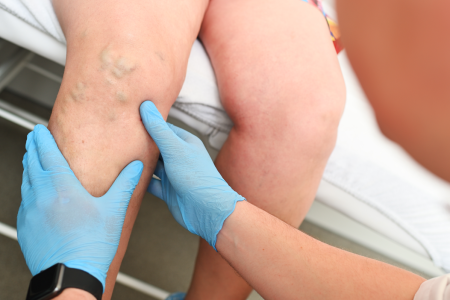Shocking medical disaster: Botched varicose vein treatment leads to leg amputation for elderly patient
Disclaimer: This story mentions amputation, chemical injections, and other medical situations that may be distressing to some readers.
Most of us have faith and trust in the healthcare system, but sometimes things can go wrong. Just like in any other profession, medical practitioners can make mistakes due to a variety of reasons–be it lack of skill, negligence, or simply a terrible stroke of bad luck.
Today, we have a distressing case from New Zealand, where a patient's botched varicose vein treatment led to a life-altering outcome.
A general practitioner’s (GP) mistaken judgement resulted in an unfortunate amputation for a pensioner in her 70s.
The woman sought treatment for varicose veins in February 2020. The GP, whose identity and locality have been hidden, performed a chemical injection procedure on her legs.
The process involved injecting a chemical into a vein to facilitate its collapse and seal off the damaged vein.
However, during the injection on her second leg, the pensioner cried out as her ankle 'exploded in pain'.
The GP had mistakenly injected the chemical into a main artery, a scenario he had forewarned the patient as a 'very rare complication'.
Even though he suspected this error, after examining both feet and noting no difference, he allowed the woman to return home. Unfortunately, it didn't take a positive turn from there.
Days later, the woman found herself in the hospital due to excruciating pain and discolouration in her feet.
In medical parlance, her feet had been deprived of adequate blood supply, resulting in tissue damage–a condition known as ischaemia.
Two weeks after her trip to the hospital, her predicament escalated horrifically. The woman had to have both her legs amputated below the knee.
Now, you're probably wondering: How did this happen?
Aged Care Commissioner of New Zealand, Carolyn Cooper, asked the same question.
After a thorough investigation, she condemned the GP for failing to send the woman for emergency immediately. This delay not only violated the patient’s Code of Rights but also had catastrophic consequences.
The GP admitted to these charges, apologising deeply for the 'devastating complication'.
He divulged that the incident had forced him to overhaul his practice and that ‘everything that can be done must be done to try to prevent this complication happening again, not only in New Zealand but worldwide’.
Yet, he later disclosed to the commissioner that he had sold his practice and no longer performs vein procedures.
The patient agreed with the commissioner, saying that the doctor should have taken proactive action instead of taking a wait-and-see approach.
The aftermath of this medical debacle ended with an accepted Accident Compensation Corporation (ACC) treatment injury claim for the victim.
This story emphasises the importance of discussing potential complications with your doctor before agreeing to any medical procedure and having a well-thought-out emergency protocol in place.

What do you think of this story, members? Share your thoughts in the comments below!
Most of us have faith and trust in the healthcare system, but sometimes things can go wrong. Just like in any other profession, medical practitioners can make mistakes due to a variety of reasons–be it lack of skill, negligence, or simply a terrible stroke of bad luck.
Today, we have a distressing case from New Zealand, where a patient's botched varicose vein treatment led to a life-altering outcome.
A general practitioner’s (GP) mistaken judgement resulted in an unfortunate amputation for a pensioner in her 70s.
The woman sought treatment for varicose veins in February 2020. The GP, whose identity and locality have been hidden, performed a chemical injection procedure on her legs.
The process involved injecting a chemical into a vein to facilitate its collapse and seal off the damaged vein.
However, during the injection on her second leg, the pensioner cried out as her ankle 'exploded in pain'.
The GP had mistakenly injected the chemical into a main artery, a scenario he had forewarned the patient as a 'very rare complication'.
Even though he suspected this error, after examining both feet and noting no difference, he allowed the woman to return home. Unfortunately, it didn't take a positive turn from there.
Days later, the woman found herself in the hospital due to excruciating pain and discolouration in her feet.
In medical parlance, her feet had been deprived of adequate blood supply, resulting in tissue damage–a condition known as ischaemia.
Two weeks after her trip to the hospital, her predicament escalated horrifically. The woman had to have both her legs amputated below the knee.
Now, you're probably wondering: How did this happen?
Aged Care Commissioner of New Zealand, Carolyn Cooper, asked the same question.
After a thorough investigation, she condemned the GP for failing to send the woman for emergency immediately. This delay not only violated the patient’s Code of Rights but also had catastrophic consequences.
The GP admitted to these charges, apologising deeply for the 'devastating complication'.
He divulged that the incident had forced him to overhaul his practice and that ‘everything that can be done must be done to try to prevent this complication happening again, not only in New Zealand but worldwide’.
Yet, he later disclosed to the commissioner that he had sold his practice and no longer performs vein procedures.
The patient agreed with the commissioner, saying that the doctor should have taken proactive action instead of taking a wait-and-see approach.
The aftermath of this medical debacle ended with an accepted Accident Compensation Corporation (ACC) treatment injury claim for the victim.
This story emphasises the importance of discussing potential complications with your doctor before agreeing to any medical procedure and having a well-thought-out emergency protocol in place.
Key Takeaways
- A New Zealand GP has apologised after a pensioner lost both her lower legs due to his mistake during a varicose vein treatment.
- The GP was criticised for not providing immediate emergency care after the botched procedure, and his treatment was found to have breached the patient’s Code of Rights.
- The patient had her lower legs amputated due to lack of blood flow after being sent home following the procedure.
- After regretting the 'devastating complication', the GP later told the commissioner he had sold his practice and would no longer perform vein procedures.
What do you think of this story, members? Share your thoughts in the comments below!









